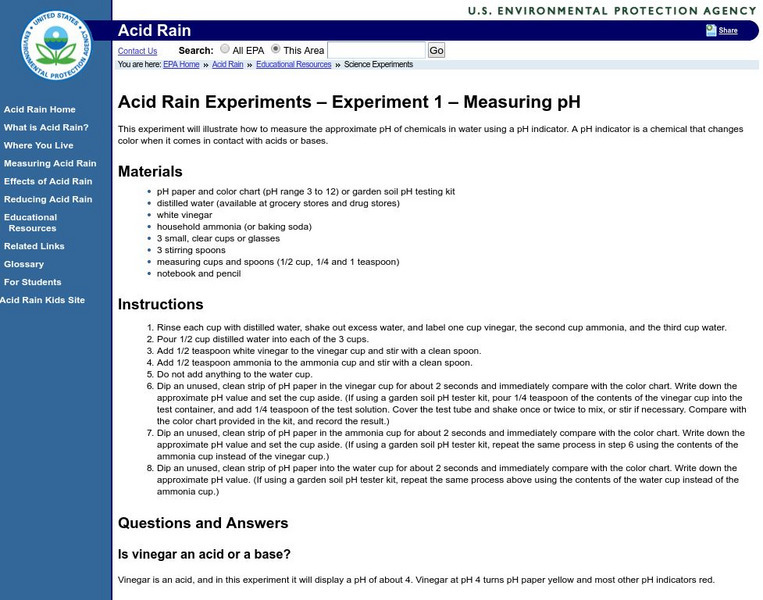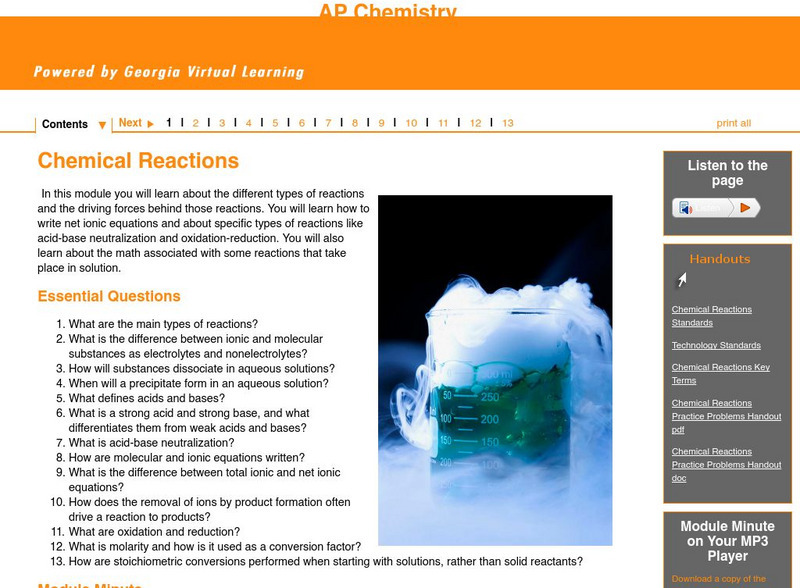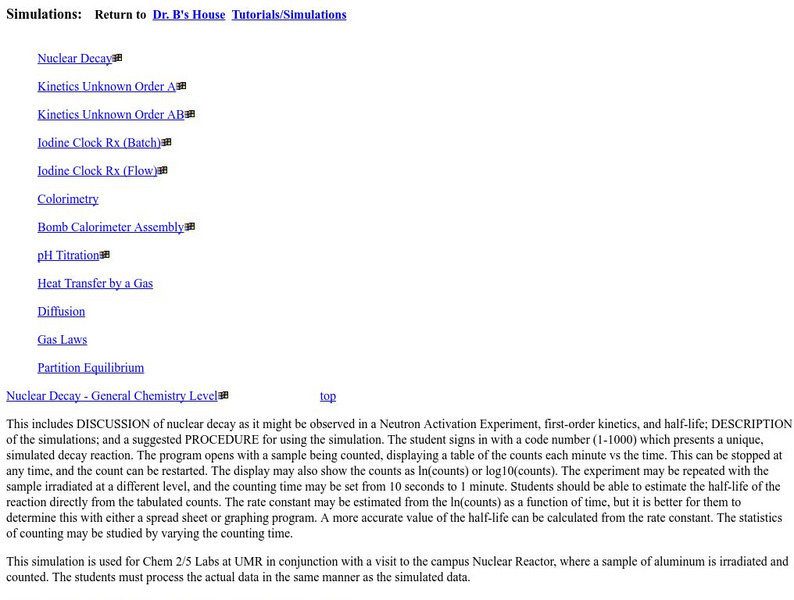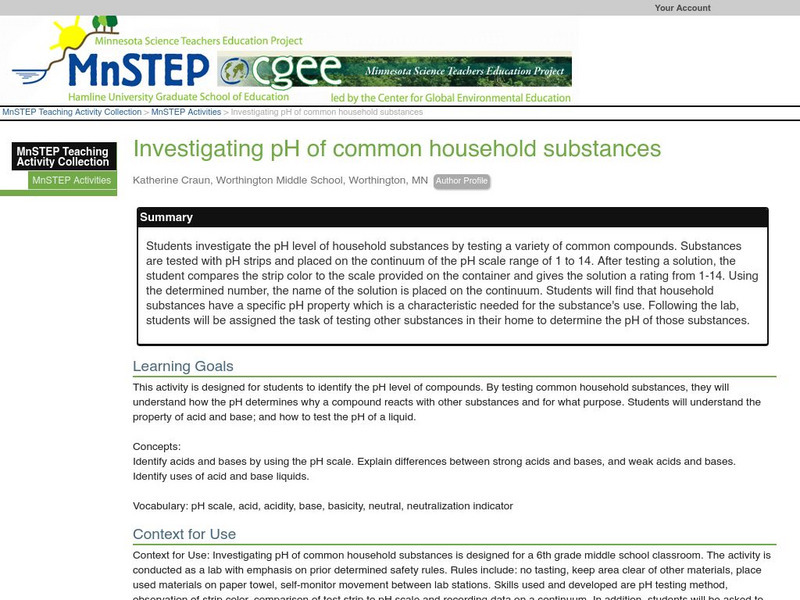US Environmental Protection Agency
Epa: Measuring P H Experiment
This is an activity that deals with acid rain. "This experiment will illustrate how to measure the approximate pH of chemicals in water using a pH indicator." It is easy to follow the comprehensive set of directions.
US Environmental Protection Agency
Epa: Making a Natural P H Indicator
At this site you will find a step by step process for making a natural pH indicator. One of the main materials you need to have on hand is a red cabbage.
Georgia Department of Education
Ga Virtual Learning: Ap Chemistry: Chemical Reactions
Students discover the different types of reactions, and the driving forces behind those reactions. They learn how to write net ionic equations, and learn about specific types of reactions like acid-base neutralization and...
Other
Basin: General Information on Alkalinity
This is a good informational site about Alkalinity. It gives a good explanation of it and some examples.
Science Bob Pflugfelder
Science Bob: The Exploding Lunch Bag
This site contains a simple procedure for observing an acid-base neutralization reaction (baking soda and vinegar), in which the product, carbon dioxide, causes a zipped bag to explode.
Texas Instruments
Texas Instruments: Electrolytes: Which Liquid Produces the Most Volts?
In this activity, students' will use a Voltage Sensor to measure the voltage produced by an electrolyte. They will understand that acids and bases are electrolytes and compare voltages of acids to the voltages of bases. Students' will...
American Chemical Society
Middle School Chemistry: Chapter 6: Chemical Change
Twelve interactive chemistry lessons about chemical changes complete with handouts and animations.
Frostburg State University
Frostburg State University Chemistry Online: Polyatomic Ions
A good reference page for anyone studying polyatomic ions. Tables included on this page organize polyatomic ions by family and by charge. Information on naming compounds with polyatomic ions is also provided. There is a link to an online...
City University of New York
P H and Indicators: Interactive Investigation
The story of the dye industry is used to introduce pH and how it is measured and calculated.
Chem Tutor
Chem Tutor: Chemistry: Titration and P H Math Problems
This is a titration and ph math problem exercise; the answers are also provided.
Chem Tutor
Chem Tutor: Titration
A concise tutorial that explains titrations and provides some practice problems with answers.
TOPS Learning Systems
Tops Learning Systems: Top Science: Cabbage Chemistry [Pdf]
Experiment using water from boiling red cabbage to determine if a material is an acid, a base, or neutral.
Texas Instruments
Texas Instruments: Titration Experiment
This activity is a fast and safe microscale experiment which allows students to quickly determine the molarity of three weak acids (vinegar, soda, and citric acid). Since the process involves a monoprotic, diprotic, and a triprotic acid,...
Science Education Resource Center at Carleton College
Serc: Magic Paper
This lesson serves as an introduction to neutralization reactions. Young scholars will observe that the goldenrod copy paper acts as an indicator changing colors and also that an acid can neutralize a base.
Other
Clemson University: Soil Acidity and Liming
Covers the composition and uses of liming materials in agriculture, as well as the lime codes of several states. Good definitions of terms: lime, calcitic limestone, calcite, dolomite, dolomitic limestone, aragonite, hi-cal lime, and more.
Simon Fraser University
Chem1 Virtual Textbook: Bases
Acting as an overview from the General Chemistry Virtual Textbook, this site explores bases and their related characteristics. Several formulas are also provided.
Museum of Science
The P H Factor
This is a great source of chemistry experiments and information dealing with pH. Learning objectives are provided to explain the basis for each activity. Japanese and Chinese versions are also provided.
Science Struck
Science Struck: The Various Types of Chemical Reactions
A detailed description of the different types of chemical reactions in organic and inorganic chemistry.
City University of New York
Brooklyn College: Bicarbonate Buffer
Explains the role of carbonic acid in the blood as part of a buffer system. Includes reactions.
PBS
Pbs Teachers: Soda Bottle Boat Experiment
Use the chemical reaction that occurs when mixing a base (baking soda) with an acid (vinegar) to turn a plastic soda bottle into a jet boat.
US Environmental Protection Agency
Epa: Measuring the P H of Natural Water
How acidic is your water? "In this experiment, you will measure the pH of natural water located near your home or school."
Other
Chemistry Tutorials and Simulations
This site includes brief Chemistry tutorials on how to simulate experiments illustrating a number of different topics.
Science Education Resource Center at Carleton College
Serc: Investigating P H of Common Household Substances
Students investigate the pH level of household substances by testing a variety of common compounds. Substances are tested with pH strips and placed on the continuum of the pH scale range of 1 to 14. After testing a solution, the student...
Texas Instruments
Texas Instruments: Sour Chemistry: The Exponential P H Change
In this activity, students' will use a pH sensor to record pH versus time data as an antacid tablet neutralizes acid in lemon juice. They will model the pH data with a modified exponential function.
















